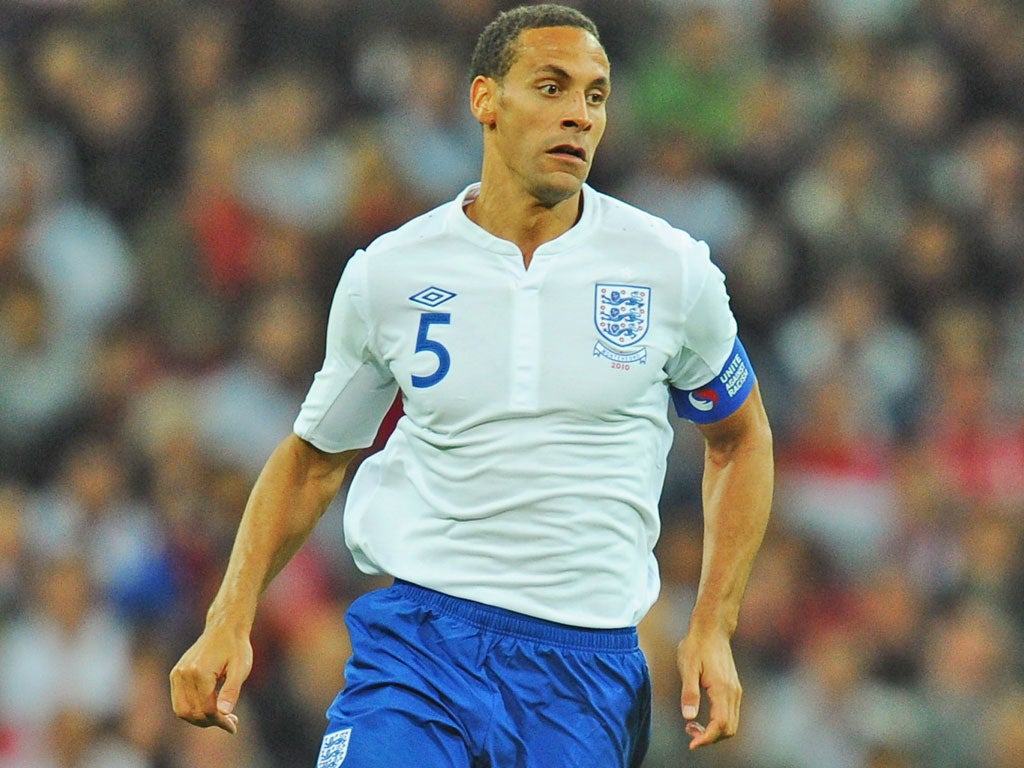Glenn Moore: The reasons why Roy Hodgson was right not to pick Rio Ferdinand

Controversy over Roy Hodgson's decision to take John Terry to Euro 2012, but not Rio Ferdinand, has dogged England's enbryonic campaign.
Glenn Moore explains why Hodgson made the decision, but argues the Football Association should not have made it for him...
1. Why did Hodgson not pick Terry and Ferdinand in the original squad?
Given their respective ages and injury history Roy Hodgson would probably had a straight choice to make between Rio Ferdinand and John Terry even if the latter had not been charged with racially abusing the former's brother Anton (a charge Terry denies). This point was unconsciously underlined by Ferdinand's agent Jamie Moralee when he pointed out Hodgson had included 30-somethings Terry, Frank Lampard and Gareth Barry in his original squad so why not Ferdinand? Lampard and Barry's withdrawal from the squad with injury provides an answer.
Even were Hodgson prepared to gamble with their fitness because of the impending court case Ferdinand and Terry clearly cannot share a hotel and dressing room together for several weeks without dividing the squad. It has been pointed out that Andy Cole and Teddy Sheringham were able to form a productive partnership for Manchester United without speaking to one another, but the pair are to an extent loners. Terry and Ferdinand are pack-leaders, having both in the squad would have led to cliques forming.
2. Why did Hodgson choose Terry?
Hodgson likes a centre-half who attacks the ball, such as Brede Hangeland who played under him in Norway and was one of Hodgson's first signings at Fulham. Terry is a defender of that type, Ferdinand is not (Nemanja Vidic takes that role at Old Trafford). The other centre-halves under consideration (Gary Cahill, Joleon Lescott, Phil Jagielka) are more like Ferdinand than Terry.
3. Why did Hodgson chose Kelly over Ferdinand?
When Gareth Barry was injured in Norway Hodgson realised he needed midfield cover, especially with Scott Parker's fitness uncertain. A lack of alternatives meant Phil Jones, already providing back-up at right-back and central defence, would now also be the reserve defensive midfielder. Teams need four centre-halves, as has been illustrated by the fate of Greece, who have lost one central defender to injury, and one to suspension. Hodgson thus called in a centre-half, Phil Jagielka, from the stand-by list.
Then Gary Cahill was injured against Belgium. This meant Jones' portfolio included being a reserve centre-half again, leaving Hodgson requiring an understudy at right-back. Thus the summons to Martin Kelly. Kelly is not likely to be needed, but being a young player will benefit from the experience of being around the squad without becoming overly frustrated by not playing. Whatever Ferdinand says about being happy to be a reserve player he has already had that experience, as a 19-year-old in 1998. He was simply pleased to be there then, but now, at 33, he will not relish just being on the sidelines. As Hodgson said, a player like Ferdinand is not called up on the off-chance he may have to play, he is called up because he will play.
4. Could this have been avoided?
Easily. The Football Association could have told Hodgson Terry was unavailable. He has not been found guilty of anything but nor has Domenico Criscito, the Italian left-back who was dropped from their squad after being implicated in the latest match-fixing scandal. Terry's alleged offence is heard in a Magistrate's Court and carries a maximum punishment of a £2,500 fine, so it is not especially serious in the context of criminal law. However, the racial aspect of it is extremely embarrassing to the FA and sends out the wrong message. In the context of Euro 2012 it leaves the FA in an impossibly conflicted position should England's black players be abused by spectators. The FA would have been criticised for appearing to pre-judge the case but Terry would have had only himself to blame. The case should have been heard by now, it was the defence counsel which asked for it to be put back until after the football season had concluded. The FA may also have been criticised for interfering with team selection, but at times a governing body has to govern.
Subscribe to Independent Premium to bookmark this article
Want to bookmark your favourite articles and stories to read or reference later? Start your Independent Premium subscription today.

Join our commenting forum
Join thought-provoking conversations, follow other Independent readers and see their replies